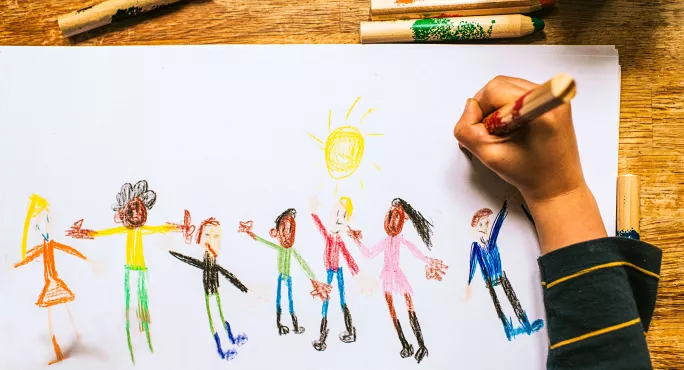Why it’s time to harness the power of social and emotional learning

Successive education secretaries have been laser-focused on driving academic success through literacy and numeracy - and, to their credit, it has worked.
Today, there are more young people passing GCSEs, getting into university and getting a job than ever before.
But, despite this, young people from disadvantaged backgrounds have remained further behind.
They are 40 per cent less likely to get GCSE maths and English by age 19, half as likely to go to university and twice as likely to be out of employment in the long term. Something isn’t working.
The research shortfall
For many years, social and emotional learning (SEL) been dismissed as a hangover from the progressive experiments of the 1970s.
We shouldn’t be surprised at this scepticism: measuring the impact of skills such as responsible decision making, self-management and social awareness is complex.
What’s more, despite a great deal of opinion in their favour, a review by the Education Endowment Foundation found the security of the evidence base was very low.
And yet the work of charities such as Football Beyond Borders, whom Impetus has supported since 2019, shows that explicitly building social and emotional skills alongside literacy can help to increase outcomes for young people who are disengaged.
For example, 78 per cent of young people enrolled on FBB’s two-year programme of two hour-long sessions each week achieve their English and maths GCSEs.
Programmes like these suggest that teaching the basics is not enough if we really want to close the attainment gap. We need to be building the skills in young people that are essential for helping them get ready to learn, too.
Teachers value SEL
Teachers and school leaders are also calling for a greater emphasis on SEL, not just because it supports young people’s mental health and wellbeing but because they believe it encompasses important skills for academic success.
Our Teacher Tapp survey of teachers and school leaders found that 92 per cent of teachers agree that SEL is crucial for attainment in school.
In particular, 60 per cent of headteachers surveyed believe strongly that these skills make a difference to academic success. Teachers clearly know that pupils need something that isn’t academic, but we don’t always agree on what that means or how to do it.
The impact of the pandemic drove a sharper focus on the importance of these skills too.
It revealed the crucial role schools play as levellers in providing social contact, social and emotional support from teachers and a sense of belonging to a community, particularly for the young people who lack this support at home.
This was highlighted in an OECD report on Covid recovery, in which the organisation called for targeted support to meet students’ learning and socioemotional skills, noting that schools are “social hubs” that support young people to develop these skills.
A new model
Working together with the Centre for Education and Youth, we recently published a “state of the nation” report to bring the threads of this debate together.
It proposes a new model of social and emotional learning, outlines the historic inconsistencies in government policy, the different views on how these skills are defined and whether they can be explicitly taught in the classroom or “caught” through the culture and ethos of a school.
It looks at whether there is a shared vision for inclusive, high-quality teaching of SEL, and how this vision might be built.
It recommends coalition building, school and teacher development, and further research along with the creation of a national network to foster consensus around definitions and best practice.
Clearly, then, there is a growing recognition on the ground that SEL has a role to play in education, but we need more evidence of the impact of these skills, which the EEF review revealed.
Building an evidence base
To that end, Impetus has brought three new charities into our portfolio: Jon Egging Trust, Khulisa and Kids Inspire.
We will provide them with intensive, structured, hands-on support from our in-house team of pro bono experts to understand the impact of investing in young peoples’ social and emotional skills and discover whether doing this at scale could deliver a step change in the long-term failure to close the attainment gap.
If we are to truly understand the potential of investing in SEL alongside academic learning, we need to delve into these issues, find the common threads and look further into what works.
We need to create a bridge between the scepticism of policymakers and the instinct of practitioners. And we need to find a consensus that moves beyond feeling that SEL matters to knowing its impact.
We’re not trying to reinvent another Seal programme, but we do want to move the conversation forward, building on the evidence, so we can finally begin to close the attainment gap that has plagued successive governments and let down the hundreds of thousands of young people who have not been able to fulfil their potential.
Steve Haines is director of public affairs at Impetus; Anamaria Granada is an associate researcher at the Centre for Education and Youth
You need a Tes subscription to read this article
Subscribe now to read this article and get other subscriber-only content:
- Unlimited access to all Tes magazine content
- Exclusive subscriber-only stories
- Award-winning email newsletters
Already a subscriber? Log in
You need a subscription to read this article
Subscribe now to read this article and get other subscriber-only content, including:
- Unlimited access to all Tes magazine content
- Exclusive subscriber-only stories
- Award-winning email newsletters
topics in this article



